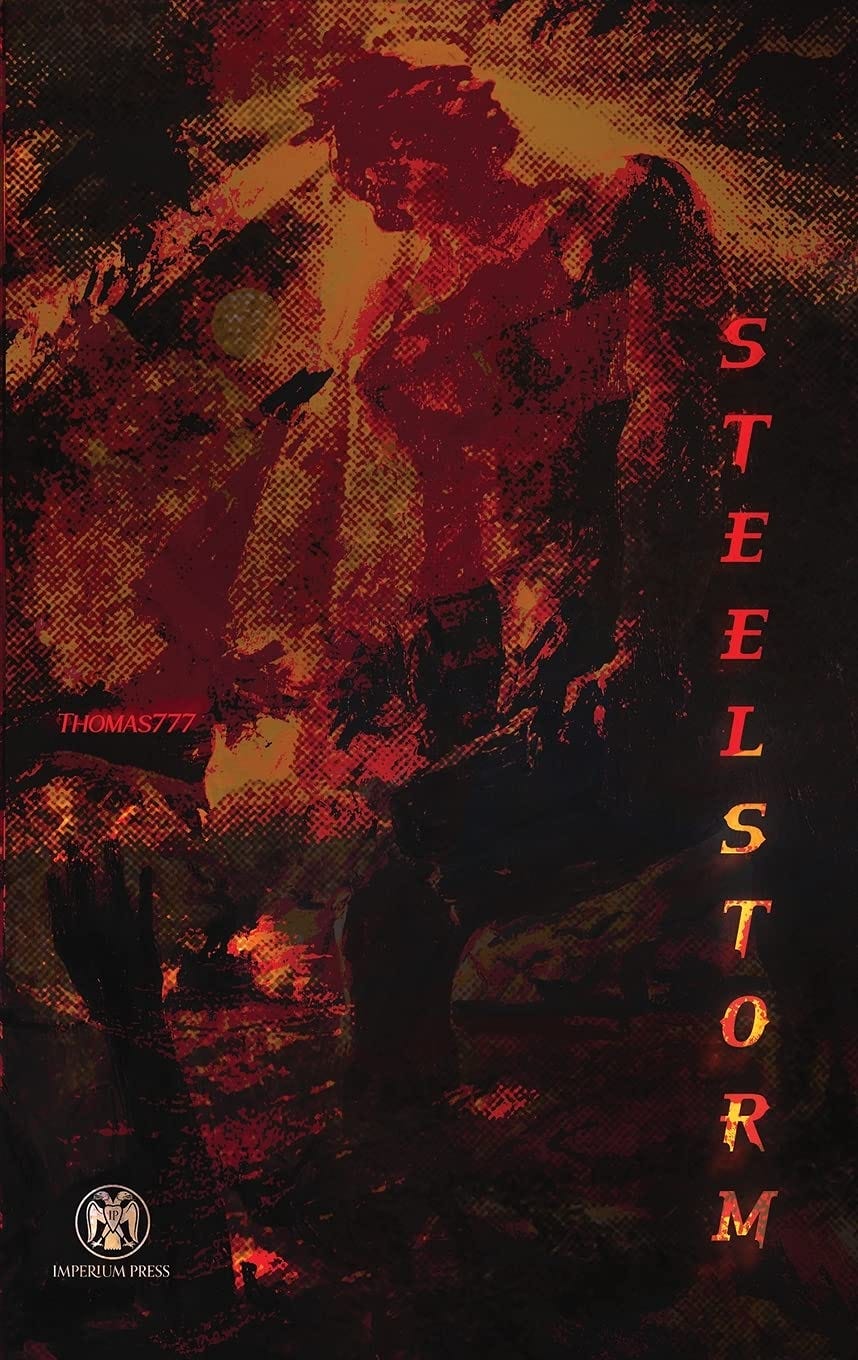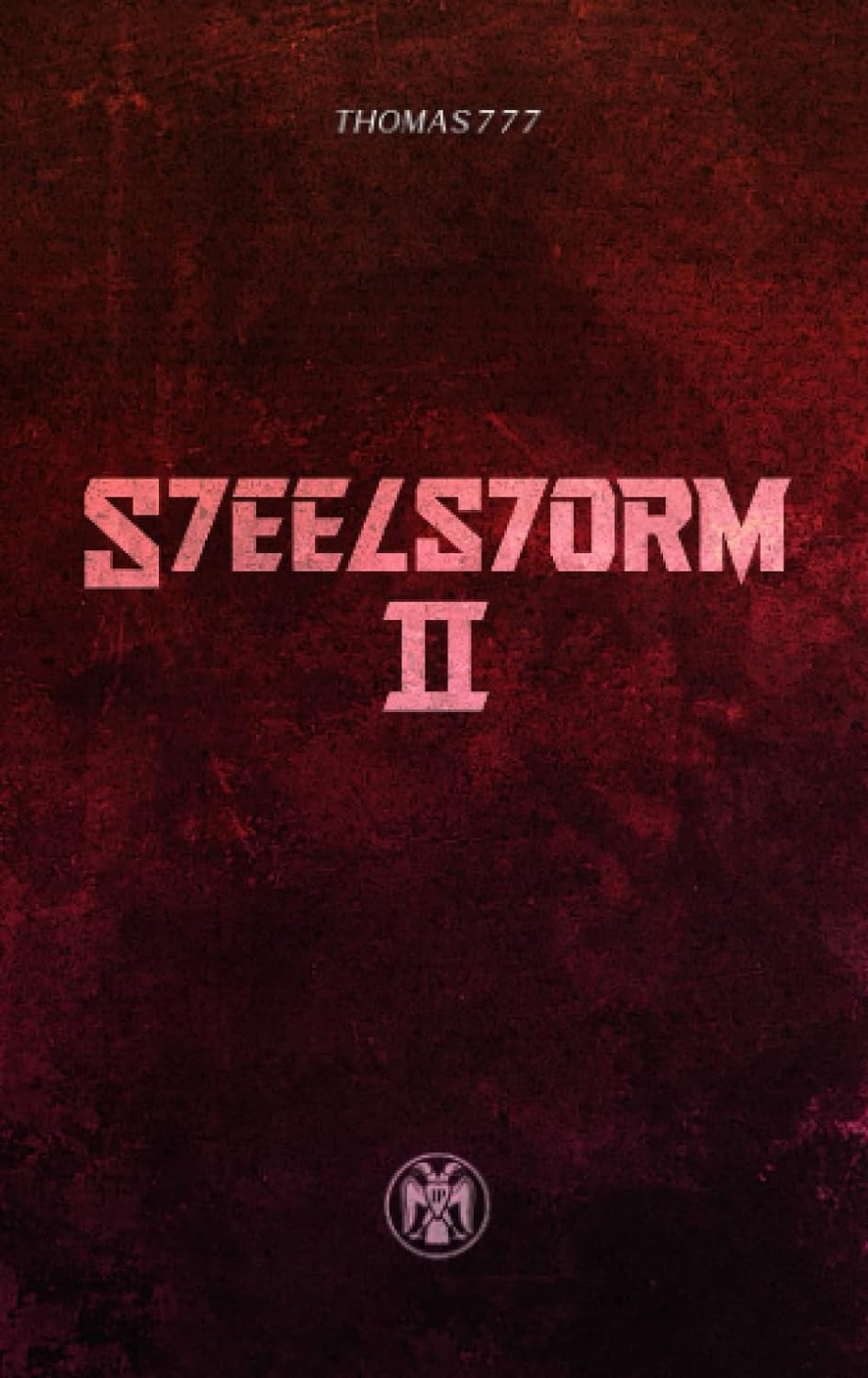Review: Steelstorm (vols. I & II) by Thomas777
A bleak, experimental tour through a bloody past and a bloodier future
The old cliché is that the best creative work comes directly from the heart; that an artist is not so much a technician or craftsman as an animal, following impulses that drive him to write or paint or otherwise bare his innermost vulnerabilities before an audience because he needs to, perhaps more deeply than he needs to eat or sleep. It’s a restrictive cliché, and many great works have been created by proficient craftsmen who simply had a job to do, but occasionally one stumbles across a reminder of why the cliché exists.
I don’t really know what I expected going into Steelstorm. Thomas777 is a figure I’ve been aware of for some time, but he isn’t really famous as an author. He’s a certified Poster - one of the best, in fact - but he’s no digital native; indeed, his Posting has a bizarre outsider art quality to it, lacking any of the usual layered in-jokes or inscrutable slang terms of the e-right and instead consisting mostly of cartoon cats, liberal use of the capslock key, and oldschool poor-white street slang alongside heavy metal biker aesthetics and grainy photos of his younger days. Naturally, when I discovered that a man like that had a book out (or two), I became interested immediately. Here was a man with an interesting mind, who had lived an interesting life; whatever else this book was going to be, I was certain it was not going to bore me.
I was right. And yet, also, I perhaps should have known what to expect. The heavy metal aesthetics I mentioned? Well - if you’ve ever tried to imagine what an 80s thrash metal album would look like if you took it to a sorcerer and had it transformed, cover art and all, into a novel, you need imagine no longer. Steelstorm, aesthetically and atmospherically, is Slayer in prose.
This book (which I’m treating as one because it really feels like one, despite it technically being released across two volumes) is a roaring mess of rage, viscera, noise and pain. It is a world stalked by mechanical beasts and gibbering berserkers, scorched by nuclear hellfire, criss-crossed with rivulets of blood and opium, filled with religious fervor, haunted by genetic ghosts and malformed psyches. If you’re put off by violence, this one isn’t for you; this might be the most violent book I’ve ever read.
If this feels like a strangely impressionistic way to describe a narrative work, it’s because it doesn’t really feel like one. There are multiple plotlines across this book, and none are told in sequence, with the chapters being chopped up and mixed amongst each other like a collage. That in itself isn’t too unusual, but what is unusual is the brevity of these chapters; most tend to focus on a brief moment in time, sometimes just a few seconds of internal contemplation or a few minutes of bloody action, with Thomas examining these moments in absolutely granular detail before moving unceremoniously onto the next chapter. By the time you reach that plotline again, you’re in another snapshot entirely, any connective tissue between moments deemed unnecessary and ignored. I mentioned metal earlier, but this actually feels more punk rock: stripping away every unnecessary element of narrative and leaving only the essentials, isolating the most memorable ideas and excising all the rest. Much as with well-executed punk rock, the effect is to leave you wondering how so much content has been packed into such a small space; the book is absolutely brimming with stark images and powerful moments, far more than most books twice its length ever manage, and they stick in your mind like gum when you’re done.
The book has one foot in the future, yes - specifically about one thousand years in the future, in what appears to be a Muslim Imperium that has colonized space - but I have to confess that my favorite plotlines are actually those from the past: the stories of Billy Wong, a heroin-addicted serial killer in the streets of Chicago in the 1982, and his father, Sang Nam Wong, a mercenary in Cambodia in 1975. Billy, in particular, is the indisputable center of the first volume; the physical sensations and emotions described are so viscerally felt, so richly textured, that even without doing any research whatsoever you can immediately tell they were deeply informed by Thomas’ own bitter life experiences, and in particular the description of heroin withdrawal is skin-crawling in its detail. I’ve read Naked Lunch, and I’m going to assume that Thomas has too, but much as I loved it, it never gave me as profound an insight into what it actually feels like to be a heroin addict as Thomas does in these pages. As for the killings, well - I hope those weren’t informed by Thomas’ own experiences, but I’m a little suspicious, because the verisimilitude there is only slightly less visceral. The first volume chapter Seed of Cain: The Immortal Hydra Two (man, I love that pulpy title), which concerns Billy falling in love, is, for my money, the centerpiece of the whole work; it’s one of the only chapters that covers a period longer than a few minutes, and it feels achingly real in its descriptions of street junkie life, its profound self-loathing, its profound self-terror. I don’t think Thomas has ever killed a woman directly, but I get the distinct impression here that there has been at least one woman for whose death he blames himself. Eventually, Billy becomes a great and terrible leader of men, conquering a nuke-scorched world and dubbing himself “Khan”; the narrator makes clear that no other type of man produced by modern society could have done such a thing.
Sang, meanwhile, spends most of his time in the Cambodian jungle bearing witness to the strange and monstrous existence of a Bosniak mercenary named Dragutin, who is “more harbinger than man - conjured into sentience by something extra-sensory yet discernibly present wherever and whenever rumors of war cross men's lips.” The disconnect between warrior and human is a theme that crops up again and again throughout the novel, made literal with the enhanced space marines of the Imperium (the Martyr Caste Executioners) and in particular the mechanical abomination that is ZARTAX, a human remade into a cybernetic war machine. I’m not as into these segments as the others because they aren’t as original; these segments frequently feel like Warhammer 40k with the corporate blinders removed, delving perhaps more deeply into the violent and sexual grotesqueries of war but otherwise striking a very familiar note. Still, I appreciate the skill with which these segments are thematically linked with those during the Cold War, with ZARTAX coming across not so much a purely speculative horror-monster as the apotheosis of war itself, the culmination of centuries of men like Dragutin and Billy ruling, dominating, and remaking humanity in their image. One chapter opens with an epigraph quoting the famous line from Blood Meridian: “War was always here. Before man was, war waited for him. The ultimate trade awaiting its ultimate practitioner.” In ZARTAX, war, having prospered so long amongst men, finally divests itself from him in the body he made for it. We exist as servants of war, playing host to it, feeding it, allowing it to grow, until, at long last, it does not need us anymore. The ultimate trade becomes its own practitioner.
This has all been rather effusive thus far, so I’ll temper it with some flaws. There may, perhaps, be a bit too much going on in this brief book; the Dune-like genetic memory angle feels like it needed a bit more exploration, and various small plotlines pop up every so often without always feeling like we’re seeing enough of them to justify their presence. The sparsity of dialogue, which often doesn’t happen for several chapters at a time, lends the novel a rather solipsistic feel at times; I feel that Thomas either should have committed to including almost no dialogue whatsoever, which would have been a fascinating avant-garde statement, or allowed a more normal amount throughout the book, because as it is it occupies something of an unhappy middle where it sometimes feels a little bit like he just forgot to let anyone speak. The first volume contains three footnotes, which in a fiction work is a little strange; a lot of footnotes would have felt like an intentional stylistic choice, but just three feels like the author is more used to writing non-fiction and hasn’t entirely slipped out of that mode. And then, of course, there is the prose, which is, to say the least, highly idiosyncratic. I’m not too bothered by bad prose in a sci-fi novel - actually, I feel a little weird when I see good prose in a sci-fi novel, so rarely do I find it - but Thomas, especially in volume I, rarely uses one word where three will do. It’s genuinely distracting at times. I expect this might be a problem I run into frequently in this scene - not like there’s an overabundance of editors in the alt-publishing sphere, to my knowledge - and I don’t intend to let it discourage me too much, but it’s one aspect of classic-era sci-fi I’m not especially eager to bring back.
It’s kind of an endearing flaw to encounter, though, like the terrible musicianship you can sometimes find in really local punk scenes. The technique may not be there yet, but the spirit is, and no lack of expertise is going to keep it from being expressed. This is a work that very much feels like it just exploded out of its author, as if he simply could not physically contain it within himself any longer; its postmodern structuring feels not so much like an intellectual decision as the natural shape the novel took upon exiting him. Whether that’s true, I don’t know, but the important thing is that’s how it feels to read, and that’s a good way for a book to feel.
There are various themes and plotlines I’m barely covering, but rather than spoiling the whole book I’m going to leave those for you, the reader, to discover for yourself. For all its flaws, I really enjoyed Steelstorm, and I’d recommend it to anyone with the stomach for it. This may, admittedly, have been a strange choice for my first dissident right novel - from what I’m told, it’s very different to the usual style for the scene - but it’s a positive start all the same, and it’s made me certain that I’ve made the right decision in starting this blog. I came looking for no-holds-barred creativity, and I’m very pleased to report that I found it. Thomas777’s politics are not mine, but is aesthetic and artistic sensibilities jive with mine just fine. I’m not sure if there’s any more Steelstorm coming, but whatever else he has in the chamber, I’m looking forward to reading it.
You can find Thomas on Substack here. You can also usually find him on X; I believe this is his current profile, although I wouldn’t be shocked if it gets banned eventually.
Until next time, folks.








Great review; thanks for touching on the important points, and thanks for being specific instead of impressionistic.
I’m torn: I love what you’ve described of the structure, but I’m worried about no holds barred gore and sex. Sometimes, boldly imagined disgusting details just make me feel sick.